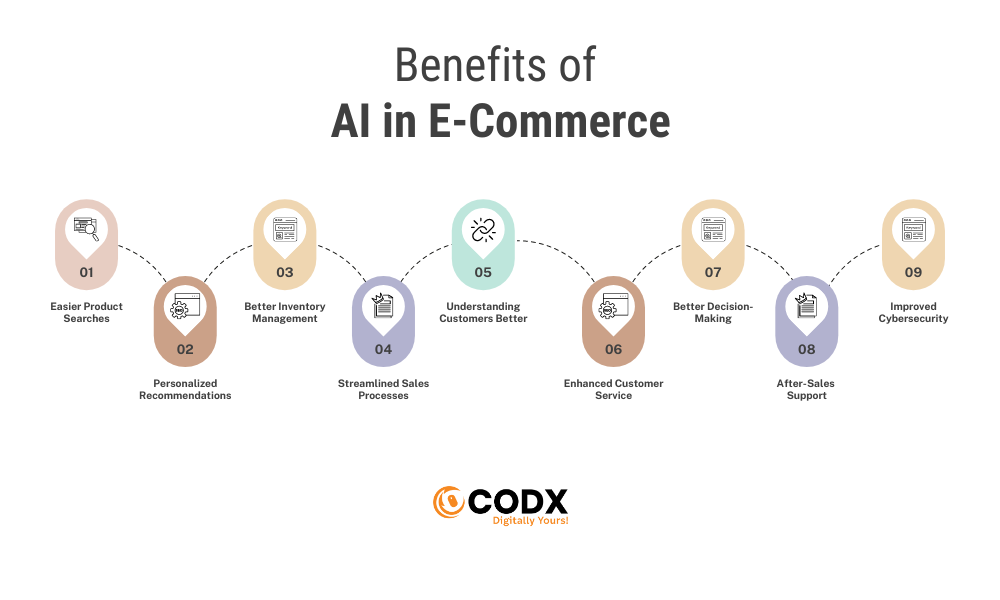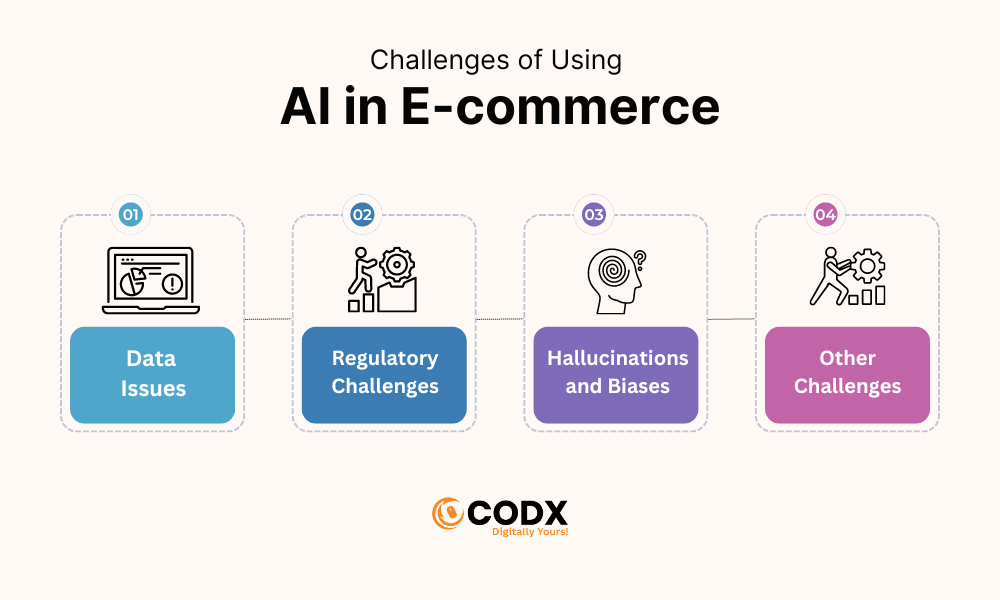AI in Ecommerce: Applications, Benefits, and Challenges
Artificial intelligence (AI) is becoming a key part of online shopping. It helps businesses automate tasks, work faster, and increase profits.
AI tools also help businesses make smarter decisions. They use data from customer activity and purchases to see what people like. With this information, companies can offer better products and services that meet customer needs.
What is AI and How its changing Ecommerce
AI is a part of computer science that focuses on building smart machines that can think and act like people. It uses advanced methods, learning from data, and solving problems in areas like customer behavior, managing stock, and improving customer experiences.
AI tools can change the way eCommerce businesses work by offering solutions that help them stay ahead in the fast-changing digital world.
AI in eCommerce gives businesses new ways to use customer data and improve the shopping experience. AI tools help automate tasks like product suggestions and personalized marketing.
With these AI improvements, online businesses can offer better services and increase sales. By making things more efficient, accurate, and personalized, AI is changing how we do business online.
Businesses already using AI are seeing great results. Now is the time to explore how AI can help your business too.
How Can You Use AI in eCommerce?
Here are 15 easy ways AI is changing eCommerce.
-
- Voice Search
More people are using voice assistants like Alexa and Siri to shop online. eCommerce businesses can benefit by optimizing for voice search. - Chatbots for Quick Help
Many brands use chatbots to answer customer questions fast. Quick replies from chatbots can help customers decide to buy. - Product Suggestions
AI can suggest products to customers based on what they like or bought before. This simple tool can help boost sales. - Automated Product Descriptions
AI can write product descriptions, saving time for businesses. These descriptions help customers understand products better. - Image Recognition
Customers can click on an item in a photo and find similar products. This makes it easy for them to discover new items. - Personalized Search
AI-powered search tools give customers more relevant results. This helps them find what they need faster. - Growth of Mobile Shopping
Mobile shopping is becoming more popular. AI can help make mobile websites and apps easier to use. - Virtual Personal Shoppers
AI virtual assistants can help customers find what they want. They act like a store employee guiding a shopper. - Faster Delivery
AI helps speed up the delivery process. In the future, robots could even deliver products to your door. - Virtual Reality (VR) and Augmented Reality (AR)
VR and AR let customers try products virtually before buying. This makes online shopping feel more real. - Wearable Tech for Sales
Smartwatches and other devices track what customers like. AI can use this data to suggest products that match their preferences. - Fighting Fake Reviews
AI can spot fake reviews. This helps customers trust the feedback they read before buying. - Easier Checkout
A simpler checkout process helps reduce abandoned carts. AI can make checking out faster and smoother. - Reselling Used Products
Reselling used products is gaining popularity. AI can help businesses tap into this trend by setting up efficient systems. - Shopping on Social Media
AI connects social media with eCommerce. Customers can shop directly from social media platforms, making the process easier.
- Voice Search
Using these AI tools can improve customer experiences and increase sales for businesses.
Benefits of AI in E-commerce

-
-
- Easier Product Searches
Most online shopping begins with a search. If users can’t find what they want, they will look elsewhere. Traditional text searches may miss the mark and show items that don’t really match the keywords. With AI, customers can upload images to find the exact products they want. This saves time and makes shopping much easier. - Personalized Recommendations
Have you noticed how e-commerce sites like Amazon show products similar to what you just viewed? That’s AI at work! AI and machine learning analyze a buyer’s past searches and purchases to recommend products they’re likely to like. This enhances the shopping experience and helps businesses boost sales. Even small e-commerce sites can benefit from creating their own recommendation systems. - Better Inventory Management
Managing inventory can be challenging. AI helps by predicting future product demand based on past data. This allows businesses to keep shelves stocked and ensure the supply chain runs smoothly. By using predictive analytics, retailers can understand their real-time inventory needs and make operations more efficient. - Streamlined Sales Processes
Before AI, sales strategies relied on cold calls and emails. Now, e-commerce businesses use AI to analyze data patterns and gain insights. This helps them improve sales by using historical data and customer feedback. Many shoppers look to social media for inspiration, and AI can help identify their preferences by analyzing large amounts of data. - Understanding Customers Better
Knowing your customers is key to growth. E-commerce sites can gather insights through surveys, feedback forms, and ratings. AI and natural language processing (NLP) allow businesses to understand customer opinions by analyzing comments and reviews. This helps them learn about customer expectations and tailor their responses. - Enhanced Customer Service
Good customer service is a priority for every business. AI-powered chatbots and virtual shopping assistants can automate customer support. These chatbots can talk with customers, answer questions, and solve problems in real time. Thanks to NLP, they understand customer messages and can help find products based on user input. They can also handle deliveries, complaints, and returns, offering support 24/7. - Better Decision-Making
AI helps e-commerce businesses make informed choices. Companies deal with large amounts of data every day, and analyzing it can be overwhelming. AI simplifies this process by spotting patterns in user behavior and buying trends, speeding up decision-making. - After-Sales Support
Selling a product is just the beginning. Good after-sales support is crucial for customer satisfaction. AI can automate tasks like sending feedback forms, processing returns, and resolving product issues. This helps improve the brand’s reputation by addressing customer concerns effectively. - Improved Cybersecurity
AI also plays a vital role in enhancing the cybersecurity of e-commerce sites. It helps detect and prevent fraud. With many daily transactions, e-commerce platforms risk attacks from cybercriminals. AI and machine learning algorithms work to reduce the chances of fraud, protecting both businesses and their customers.
- Easier Product Searches
-
Challenges of Using AI in eCommerce

AI in e-commerce faces several challenges. First, it needs accurate data to work well, but collecting and analyzing this data while protecting customer privacy can be difficult. Second, AI algorithms must be updated regularly to keep up with changing customer preferences.
Data Issues
Lack of data, messy information, and biased algorithms can hinder AI’s effectiveness in e-commerce. Businesses must invest in data quality and diversity to address these issues.
Regulatory Challenges
Companies must comply with data privacy and consumer protection laws when using AI. Collaborating with policymakers and regulators can help create guidelines for responsible AI use in e-commerce.
Hallucinations and Biases
AI systems can sometimes generate false or misleading information, known as “hallucinations.” Additionally, biases can arise when AI is trained on unfair data, leading to discriminatory practices.
Businesses should monitor their AI systems to identify and fix errors or biases. Establishing clear ethical guidelines and regulations can help ensure AI systems are transparent and responsible. However, monitoring requires time and resources.
Other Challenges
Privacy concerns and data security are important considerations. AI relies heavily on user data for personalized recommendations, making it crucial to protect this information. Balancing automation with human interaction is also essential for a positive shopping experience.
By addressing these challenges, businesses can harness the power of AI to improve their e-commerce operations and gain a competitive edge.
e challenges, you can prepare your eCommerce business to use AI effectively.
Conclusion
In the future, machine learning and AI will change the eCommerce industry. But we can already see many examples of AI in online shopping today. AI helps improve the customer experience and offers new solutions for eCommerce businesses.
Some of the most common uses of AI in eCommerce include product recommendations, personalized shopping experiences, virtual assistants, chatbots, and voice search. The benefits go beyond just these features. AI also helps businesses collect and analyze customer data. This allows them to tailor their services to match each customer’s interests and preferences.
As an award-winning agency, Codx takes pride not just in the digital solutions we offer our partners but also in our advisory expertise.
We are here to help you create the perfect plan for your exciting new business venture. Whether you are just starting out or considering the idea, we’ve got you covered.
Contact us today and let’s discuss how we can develop a customized metaverse strategy to position your brand for success in the e-commerce revolution!
Invest in personalization and watch your e-commerce business soar. Let Codx Software be your guide! Book your free consultation now.
- 60 views
- 0 Comment


